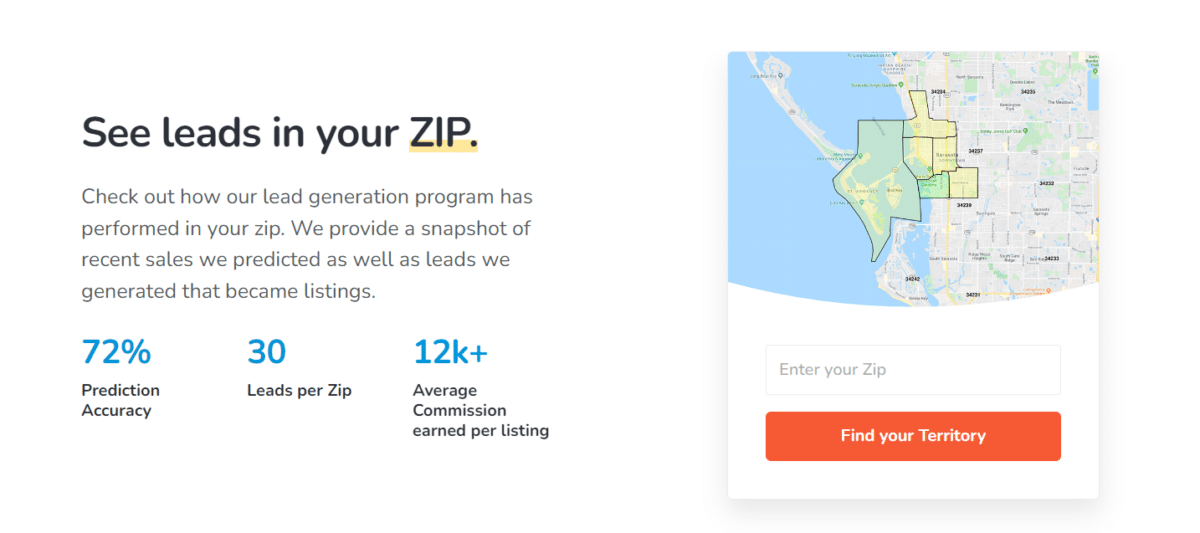Imagine knowing exactly which homeowners in your area will sell their property in the next 12 months. It used to take a mind reader (or a lot of luck) to get that kind of inside intel on your local real estate market, but now it’s achievable with big data and the right predictive analytics company.
You need to embrace this technology and use it to help more clients (and help your pockets grow, too)! I will break down what predictive analytics in real estate are, how you can use them, their benefits, and which real estate analytics software you can use to boost your business. Here we go!
What Is Predictive Analytics in Real Estate?
Predictive analysis is a technique that uses data, statistical algorithms, and machine learning to identify the likelihood of future outcomes based on historical data. It involves analyzing current and past information to predict future events.
In real estate, predictive analysis can help agents forecast market trends, identify potential buyers and sellers, set competitive prices, and make strategic business decisions. These real estate analytics companies pull together millions (if not billions) of data points from multiple sources to give you important insights.
Common data sources include the following:
- Property
- Demographics
- Behavioral trends
- Event data (user-generated activity data from products, software, or websites)
Why Predictive Analytics Matters in Real Estate
If you’re a MARVEL fan, you may remember in Captain America: The Winter Soldier the scene where Jasper Sitwell gets kicked off the roof by Black Widow for information about Zola’s algorithm. Ok, we won’t be kicking anyone off any rooftops, but Zola’s algorithm is a great example of predictive analysis. It provided data on who to target, when to target them, and how to take them down.
The same concept is applied to PA in real estate. Imagine if you had a list of homeowners in your farm area who were identified via predictive analytics as highly likely to sell their homes in the next 12 to 18 months. Think of the time, energy, and money you could save by marketing specifically to those homeowners. You can make it work for you in your real estate business with a company that knows how to harness it.

Ok, let me give you some actual data to consider. One of our top picks, Offrs, provides 30 guaranteed leads in a chosen ZIP code every month, and those leads come with an astounding 72% prediction accuracy rate. Assuming that prediction rate, you’d have about 20 solid leads each month. The average listing commission is over $12,000. So, if you convert half of your leads, that’s $120,000. As Offrs says: It’s not magic; it’s math.
Benefits of Using Predictive Analytics for Real Estate
Real estate predictive analytics is changing the game, giving agents and brokers powerful tools to understand market trends and customer behaviors. With tons of data and smart algorithms, this tech helps you make better decisions, market more effectively, and stay ahead of the competition.
Using predictive analytics in real estate offers several key benefits:
- Accurate market predictions: Helps agents predict market trends, including which properties are likely to sell and when.
- Targeted marketing: Allows more accurate marketing efforts by identifying potential buyers and sellers, leading to better conversion rates.
- Improved pricing strategies: Assists in setting competitive sales prices based on data-driven insights rather than gut feelings.
- Enhanced customer insights: Provides a better understanding of customer preferences and behaviors, allowing you to personalize your services.
- Competitive advantage: Gives agents an edge over competitors who may not use predictive analytics.
- Increased sales: Ultimately leads to higher sales and revenue through more effective and targeted business strategies.
How Agents Can Use Predictive Analytics
Now that you know what PA is, why it’s important, and what the benefits are, it’s time to put predictive analysis to work for your business. While residential real estate analytics isn’t fully on par with the commercial side yet, we’re getting closer to seeing every agent, team, and broker using AI or data analytics tools in 2024.
Here are a few ways you can start to incorporate PA into your business practices:
The Best Predictive Analytics Companies in 2024
Wondering which companies are at the forefront of predictive analytics in real estate? These companies are transforming how agents predict market trends and make informed decisions. If you’re considering integrating predictive analytics into your real estate strategy, here are some top recommendations for real estate data analytics companies that are reshaping how agents predict market trends, identify potential clients, and optimize their business strategies.
Take a look at some of the top players in the game.
| Company | Best For | ||
|---|---|---|---|
| Smartzip | Seller leads | ||
| Offrs | Seller leads + marketing | ||
| Catalyze AI | Leads related to inherited property | ||
| Top Producer | All-in-one lead generation and CRM solution |
1. Smartzip: Best for Sellers Leads
 |
|
|---|---|
Pros | Starting Monthly Prices
|
Cons |
|
By combing through consumer data (from places like credit card companies), market data (from places like your MLS), and demographic data, Smartzip predicts which homeowners in your targeted region are most likely to sell. Realtors who sign up with Smartzip immediately get access to the Smartzip CRM, populated with “Smart Data” for their areas.
Essentially, this is a list of all the property owners in your targeted area, ranked by how likely they are to sell their home in the next year and a half. Armed with this information, you can focus your outreach on only the most likely sellers, saving you time and money on marketing efforts and making your lead conversations more meaningful and fruitful.
Smartzip: Is It Right for You?
If you’re already investing heavily in real estate farming and seller lead nurturing, Smartzip is an excellent real estate predictive analytics tool for you. Since leads from Smartzip tend to take a little longer to nurture than traditional listing leads, you will need a solid keep-in-touch strategy. If you’ve got a good lead nurturing game in place, Smartzip is absolutely worth considering.
2. Offrs
 |
|
|---|---|
Pros | Starting Monthly Prices
|
Cons |
|
While Offrs is owned by the same company as Smartzip, the actual product is very different. Both are built on the same Smart Data platform, but Offrs customers also have access to sophisticated and automated marketing and nurturing tools.
Plus, the Offrs Roof referral system is an added bonus. For a 25% referral fee, Offrs’ call center and email marketing team will initiate at least 30 touches in the first 90 days, starting immediately when a lead comes through. This makes the nurturing process even less of a lift, especially since about 67% of clients go with the first agent they speak with.
Offrs: Is It Right for You?
If you need automated marketing services, this is a platform you should absolutely consider. If you don’t need the more specialized lead types or automated marketing features, you’re probably better off going with Smartzip, with its upgraded CRM and user interface.
3. Catalyze AI
Pros | Starting Monthly Prices
|
Cons |
|
Every year, hundreds of thousands of properties are inherited. Catalyze AI helps sort through all of the data points (over 400 million of them) to narrow these properties down to excellent leads. It is so excellent that it boasts that four out of 10 predicted leads sell within 12 months. Catalyze AI estimates this market represents $77 billion in property value each year.
I like that Catalyze AI offers leads within a 20-mile radius of your search area and that you can pay based on the value of the property: one monthly rate for properties valued above $1 million and one for below. And finally, and perhaps most importantly, these leads are exclusive, which makes them pretty darn valuable.
Catalyze AI: Is It Right for You?
Inherited property leads are fairly niche, and it takes someone with strong interpersonal skills to convert them, especially if the new property owner is recently bereft. It will also take patience and strong follow-up. That being said, this is a really strong market, and the leads are local, not outrageously expensive, highly probable to convert, and exclusive. Because it’s month-to-month, it’s definitely worth checking out Catalyze AI; it’s a company in the PA space that we’re excited to watch.
4. Top Producer
Pros | Starting Monthly Prices
|
Cons |
|
While Top Producer’s predictive analytics product, called Smart Targeting, isn’t far from what other PA companies are doing (in fact, its data is supplied by the same company as Offrs and Smartzip), it is unique to have the analytics as part of a larger lead generation and tracking ecosystem. There are some real advantages to having everything working together in the same place. If you’re using Top Producer, one of our favorite CRMs in the industry, to prioritize, track, nurture, and convert leads fed to your funnel by predictive analytics, you’re cooking with gas, as they say.
Top Producer’s biggest value is in its CRM, which allows a busy agent to rely on automatic follow-up with leads. It’s not cheap—in fact, it’s hard to tell exactly what Smart Targeting costs as it’s an add-on to the base price—but it is an exciting development in the industry. Synergy between all of your sales and marketing is a beautiful thing.
Grow your database with a steady stream of affordable, exclusive real estate leads from social media ads. Social Connect from Top Producer is designed to get you a high volume of leads and move them through your pipeline until they’re ready to buy and sell real estate. Connect with an average of 30 consumers interested in real estate in your local market for just $300 per month!
How Social Connect works:
Top Producer: Is It Right for You?
If you already have a CRM that you love, Top Producer isn’t for you. You’re better off subscribing to Offrs or Smartzip and integrating it into your existing CRM. It’s only if you’re already using Top Producer or you want to make a CRM change that you should consider jumping in with two feet. Real magic can happen when all of your systems are not only talking to each other and working together, but also taking advantage of cutting-edge technology that can skyrocket your business.
Are you a lender or homeowner interested in hearing about other great predictive analytics tools that are easy on the wallet? Check out our review of Homebot to kick off your search.
Methodology: How I Chose the Best Predictive Analytics Companies
Our methodology at The Close ensures that our team of professionals, writers, and editors thoroughly analyzes each platform. We meticulously evaluate the features, usability, integration capabilities, performance, and affordability of the AI tools available for real estate.
Even though our team has decades of combined real estate experience, navigating through the wild, complex, and sometimes confounding world of data analytics wasn’t easy. To make sure we were using objective measures, in addition to our educated opinions, we looked at these five key criteria to select our picks for the top companies:
- Affordability and value for money: Cost was an important consideration. We looked for tools that provided a good balance of features and return on investment.
- Feature set and functionality: We evaluated the range of features each tool offers and focused on how impactful these features are to real estate operations.
- Usability and customer ratings: We looked for tools with intuitive interfaces, straightforward navigation, and comprehensive support resources. We want to ensure it can be easily integrated into an agent’s workflow.
- Integration capabilities: Because so many tools are needed in the real estate industry, we want to ensure that an agent’s technology stack can communicate with other tools necessary for business.
- Effectiveness and performance: We considered the effectiveness of each tool to make sure that it increased productivity and would achieve the desired outcomes that it promised.
Frequently Asked Questions (FAQS)
What are the challenges of using predictive analysis in real estate?
Using predictive analysis in real estate can be tricky. Data quality and availability often need to be more consistent, making it hard to get accurate predictions. Market conditions can be volatile, influenced by economic factors and unexpected events like natural disasters. Models can sometimes be overly complex or too closely tied to past data, reducing future accuracy.
The tech side of things also presents hurdles, from needing complex equations to finding the right algorithms. On top of that, human factors like expertise and bias can impact results. Let’s also not forget any legal and ethical considerations like privacy, which must be considered. Real estate agents are also resistant to change. Combine that with the higher cost of obtaining these analytics, and it can be a difficult sell to a broader audience.
What problem is being addressed by applying predictive analytics to real estate?
Applying predictive analytics to real estate helps take the uncertainty out of marketing. It is aimed at providing more accurate property valuations, predicting market trends, and spotting investment opportunities. This helps everyone involved—buyers, sellers, investors, and real estate pros—make smarter decisions, cut down on marketing risks, and boost profits.
How do predictive analytics impact the real estate industry?
Predictive analytics have a big impact on the real estate industry by making it more efficient and data-driven. They help with pricing properties more accurately, spotting market trends early, and finding the best investment opportunities. This means buyers, sellers, and investors can make smarter choices and cut down on risks. For real estate agents, predictive analytics make things run smoother, improve marketing, and boost overall efficiency. Basically, they take a lot of the guesswork out, leading to better results for everyone in the market.
Bringing It All Together
Data analytics, and predictive analytics specifically, is an exciting, cutting-edge field that has the potential to completely shake up our industry. I believe that agents, teams, and brokers will see a serious ROI with the right data analytics tool. I hope this guide has helped narrow down the options and decide what might be the right company (or companies) for your business.
Are there any predictive analytics companies serving the real estate world that we missed? Who should we include the next time around? Tell us in the comments below!












Add comment